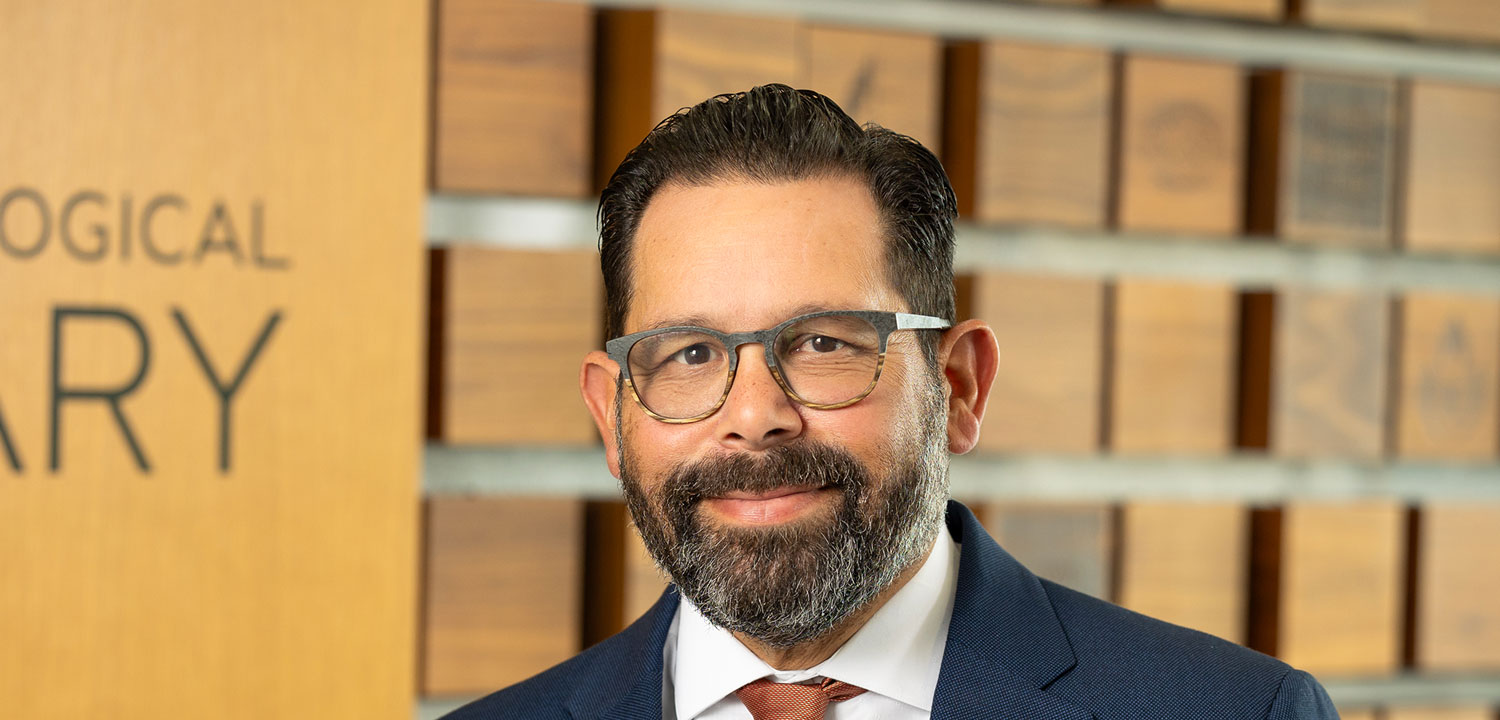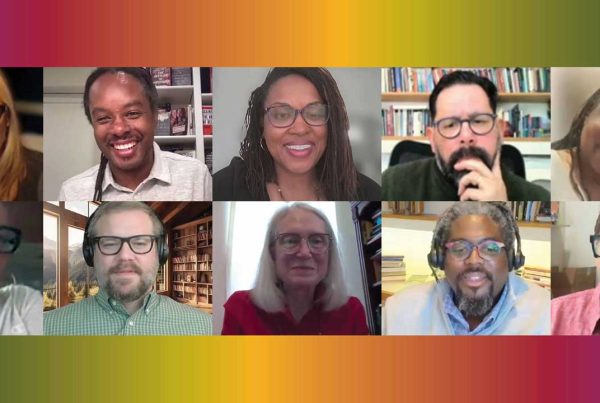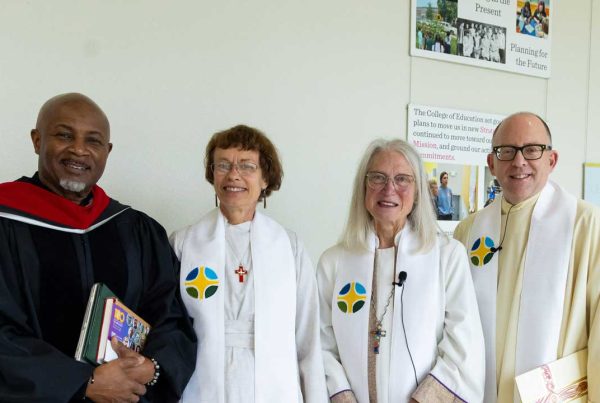Get to Know Dean Lozada
Dr. Francisco Lozada, Jr. joined Christian Theological Seminary this past July as Vice President for Academic Affairs, Dean of the Faculty, and Professor of New Testament Studies. Dean Lozada brings a wealth of academic, institutional, and personal experiences that promise to offer a unique perspective to our community.
Dean Lozada’s arrival at CTS has been warmly welcomed by the community. Transitioning into a new administrative role always comes with a learning curve, and he has embraced this challenge. Currently, he is in a phase of understanding and observation, familiarizing himself with the roles of individuals and departments, all the while looking ahead to strengthen and guide CTS into the future.
“It has been a joy to learn about the history, traditions, and significance of CTS in the development of theological education, particularly in the Indiana region. Assuming a new administrative position entails a shift in perspective. I am currently in a phase of listening, asking questions and observing as I learn about the roles and responsibilities of our staff, faculty, the School of Counseling, and the School of Theology. At the same time, I’m looking ahead. Where is CTS going to be in 5 years? 10 years? Everything I contribute to will shape that future, and I consider it an honor and responsibility to fulfill my duties with intentionality,” Lozada shares.
Dean Lozada’s family consists of his partner Wendi and their two Gen Z kids. His upbringing in Cleveland was marked by a strong Catholic influence, combined with a love for sports and parish life. Growing up in a diverse neighborhood, he forged friendships with people from various racial and ethnic backgrounds, which laid the foundation for his deep appreciation of diversity and inclusion.
Dean Lozada’s move to Indianapolis has felt like a homecoming in some ways. He draws parallels between Indianapolis and his hometown of Cleveland, emphasizing the Midwest’s friendly and down-to-earth way of living. He says, “The people of Indianapolis are very proud, authentic, and constantly advocating for improvement. So far, I am enjoying it a lot.” He appreciates the four distinct seasons and the strong sense of community engagement and advocacy that he has encountered in the city. Additionally, Dean Lozada has been intrigued by the significance of religion in Indianapolis and is actively exploring this aspect of the community.
Outside of his academic pursuits, Dean Lozada is an avid cyclist, finding both peace of mind and spirituality in this activity. Cycling allows him to contemplate and generate ideas while also serving as a stress reliever and wellness booster. He says, “I cycle for peace of mind. There is an element of spirituality in it, too. I think a lot during my ride; of course, I’m always focused on the road, but a lot of my best ideas emerge when I’m on the bike.” He participates in road and gravel cycling events and races for fun rather than fierce competition, aligning with his holistic approach to life. Dean Lozada also enjoys hiking when the opportunity arises, seeking a balance between his academic and physical interests in pursuit of wellness.
Dean Lozada also enjoys reading, and his literary preferences are eclectic, spanning various genres such as mystery, history, and fiction. He just finished Killers of the Flower Moon by David Grann and has now turned to readings directly related to his research agenda. He recently submitted an article on Johannine hospitality and is currently working on an essay on the history of U.S. Latino biblical interpretation. He frequently delves into academic fields like American studies, borderland studies, and Latino studies. His unique approach involves drawing knowledge from these diverse fields and applying it to his specific work in New Testament studies. “While some people start inside the field of New Testament for their interpretative work, I like to draw from outside fields and bring those insights back into New Testament studies,” explains Lozada.
Members of the CTS community who are sports fans will be happy to learn they have a kindred spirit in Lozada. He is a self-proclaimed supporter of Chelsea soccer in the English Premier League, college football through the Ohio State Buckeyes, his hometown Cleveland Browns (though he says he doesn’t stay up late enough to watch many of their games these days), the WNBA, and especially the United States Women’s National Team in Women’s World Cup Soccer. Lozada shares, “I see so many glimpses of religion in sports. The rituals, the symbolism, the sense of community. You see it a lot in soccer. You have the chants and the gestures to the Divine. You also witness the same societal issues prevalent in today’s society, such as racism, sexism, hypermasculinity, and xenophobia, affecting players, teams, leadership, and fans. Understanding sports at a deeper level is one way pastors can connect with their congregations on a human level.”
During Hispanic Heritage Month, from September 15 to October 15, Dean Lozada emphasizes the importance of recognizing the significant contributions of Hispanic and Latino communities to the narrative of U.S. identity. He encourages individuals to understand that these communities have always been part of the U.S. American story. This month is not just about highlighting their history and presence but also reflecting on what it means to be Latino in this country, ensuring they are central to the ongoing narrative of the United States.
“We’re living in very challenging times regarding minority voices in society, politics, religion, and the church. What’s so crucial about Hispanic Heritage Month is that it helps people understand that our Hispanic and Latino community members are an integral part of the narrative of U.S. identity. They haven’t just recently arrived as visitors; they’ve been here for several centuries. When we consider narrating the beginning history of the U.S., should we begin with the arrival of the new immigrants the Pilgrims and the annihilation of indigenous communities, or do we start with the arrival of the Spanish in the Southwest and colonial violence, or perhaps with 1645 when African slaves first arrived, or all the above?
Some historians argue that the development of the Southwest was just as active as the Northeast with indigenous communities, marking the beginnings of what today we call the United States. Many people are part of that story but don’t always become THE story. When we have months like Hispanic Heritage Month, it foregrounds their participation and their role in what it means to be part of the U.S., not just on paper but in real life. The U.S. holds great ideas and principles, but we often struggle to live up to them. We talk about diversity, ‘e pluribus unum,’ but we don’t always live out these principles. This tension is part of U.S. history; even our founding fathers had these principles and didn’t always adhere to them. It’s about each of us finding our place in the narrative.
I don’t want Hispanic Heritage Month to be about looking at difference as objects, as colonial anthropologists did in the past with an exotic eye. Instead, let’s approach it like ethnographers do looking at difference as subjects. I don’t care for moving in the former direction. Instead, let’s ask, ‘How do we lift up the ways people are part of the story?’ What I’m seeing out there with certain legislation and policies is the exclusion of their participation within that story. It’s an issue not just in U.S. history, but also in the history and theological story of Christianity in the U.S How does difference become part of CTS’s story?
I encourage people to explore and do their homework, spending time researching significant Hispanic and Latino/a/x contributors to our history this month. I believe that’s the importance of Hispanic Heritage Month – gaining a deeper understanding of the numerous contributions made over decades and centuries by what we now call today Latino people, Latin people, Latinx people,” proclaims Lozada.
As we continue to celebrate National Hispanic Heritage Month, we also celebrate the rich diversity and knowledge that Dr. Lozada brings to our community at Christian Theological Seminary. “Part of the reason that diversity means so much to me is my experience as a child. I grew up in a struggling economic neighborhood that was quite ethnically and racially diverse. I had friends from many backgrounds – white friends with roots from Appalachia and Eastern Europe, African American friends, Latino friends, Native American friends, and immigrant friends. What brought us together was our economic background, but there was a great benefit in being exposed to different foods, culture, and way of life at an early age,” he reflects.
Considering the ways he has immersed himself in life at CTS, it’s exciting to contemplate the many ways he will lead CTS in staying rooted in our core values while championing new growth for the future.






